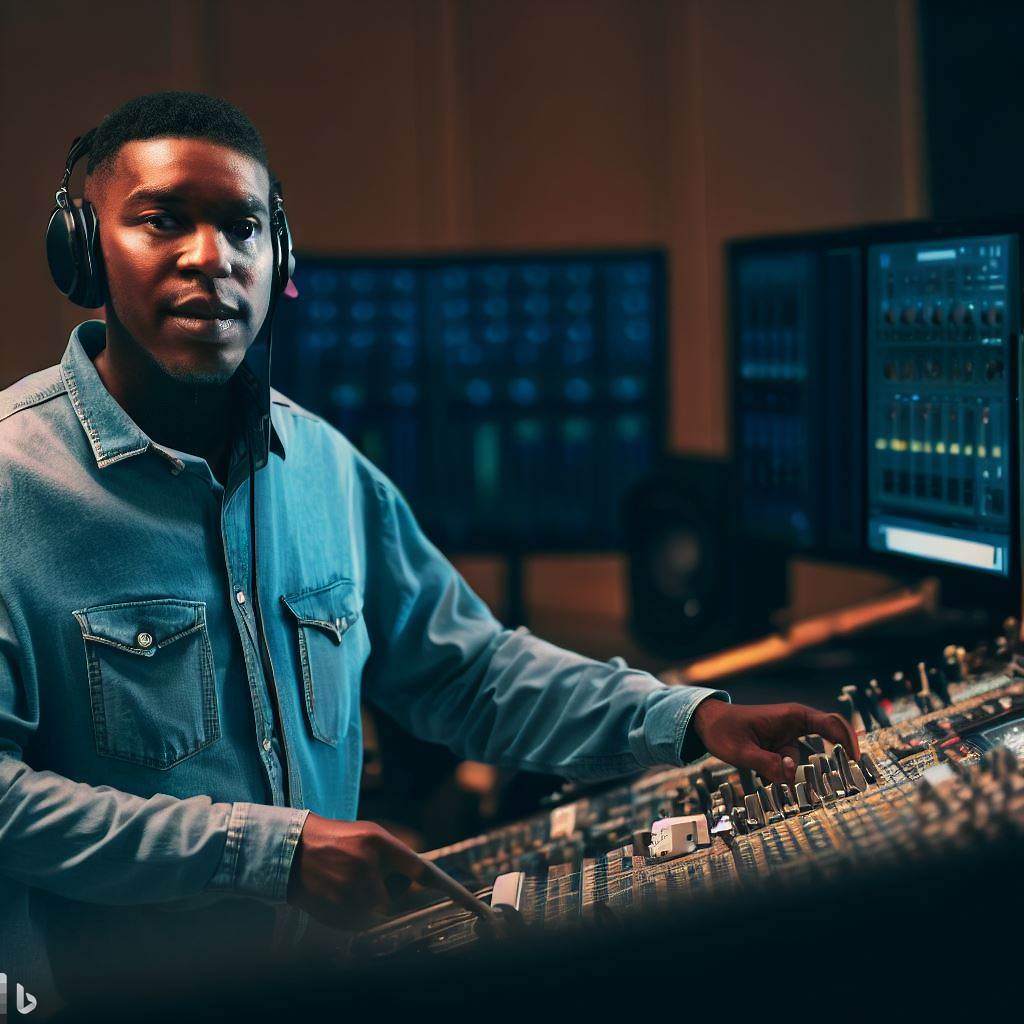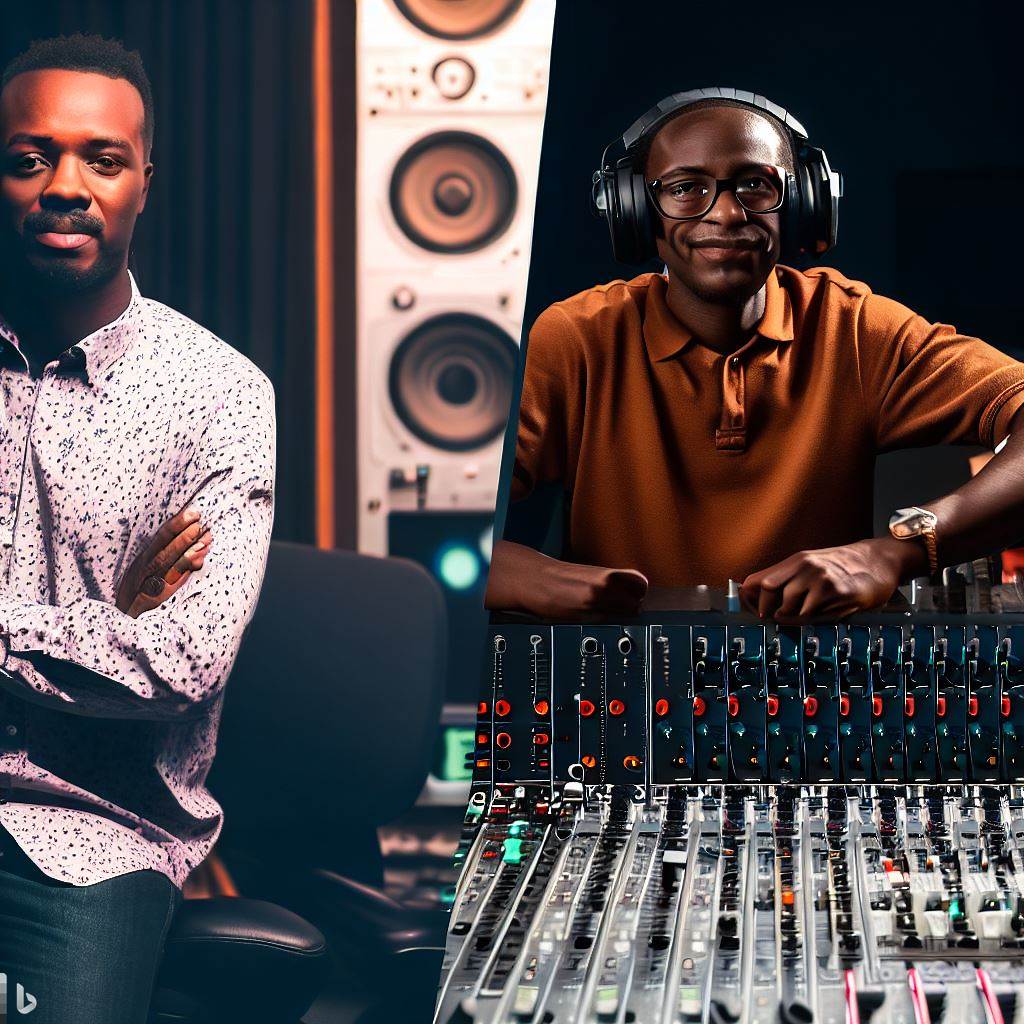Introduction
The creative process is the journey an artist goes through from idea conception to final product. It involves ideation, experimentation, and refining.
Understanding the creative process is crucial as it provides insights into how artists bring their ideas to life.
By understanding the creative process, you can appreciate the effort and dedication put into each project.
It also allows you to collaborate effectively with artists, fostering better communication and achieving desired outcomes.
Moreover, understanding the creative process helps you comprehend the intricacies of artistic expression and its impact on society.
Whether it’s music, visual art, or any other creative field, the process remains essential for artists.
This blog post delves into the creative process of a Nigerian mixing engineer. By exploring the unique approach and techniques employed, we gain valuable insights.
These insights will help us appreciate the artistry behind mixing engineering and its role in music production.
We will further examine the challenges faced by a Nigerian mixing engineer and how they overcome them.
Overall, this post aims to shed light on the creative process within the context of a Nigerian mixing engineer’s work.
Role of a Nigerian Mixing Engineer
A. Definition and responsibilities of a mixing engineer
- A mixing engineer is a professional responsible for combining and balancing audio tracks to create a polished and cohesive sound.
- They work closely with producers and artists to understand their vision and bring it to life through audio mixing.
- Their primary responsibilities include adjusting volume levels, panning, equalization, and adding effects to enhance the overall sound quality.
- They ensure that each instrument and vocal is balanced and properly placed in the stereo field.
- Mixing engineers must have an excellent understanding of audio equipment, software, and technical aspects of sound production.
B. Importance of their role in the music industry
- Nigerian mixing engineers play a crucial role in the music industry by transforming raw recordings into professional, radio-ready tracks.
- Their skills and expertise contribute to the overall quality and marketability of a song or album.
- They bring out the best in the music by highlighting its strongest elements and effectively managing sonic elements.
- A well-mixed track can capture the attention of listeners, increase the chances of airplay, and ultimately lead to commercial success.
- The role of a mixing engineer is vital in bridging the gap between artistic vision and sonic execution.
C. Specific challenges faced by Nigerian mixing engineers
- Limited access to high-quality recording and mixing equipment can hinder the work of Nigerian mixing engineers.
- Power supply fluctuations and infrastructure issues can disrupt recording and mixing sessions.
- Financial constraints often limit the possibilities for investing in advanced software and hardware.
- Cultural diversity and vast range of musical genres in Nigeria present unique challenges in terms of understanding and catering to different artistic visions.
- Communication barriers between artists and engineers, due to language differences or lack of technical knowledge, can pose challenges in achieving the desired sound.
To summarize, a Nigerian mixing engineer is an integral part of the music production process.
Their responsibilities include combining and balancing audio tracks, ensuring a polished sound, and enhancing the overall quality of the music.
They play a vital role in the music industry by bridging the gap between artistic vision and sonic execution.
Despite specific challenges faced by Nigerian mixing engineers, their skill and expertise contribute to the success and marketability of songs and albums.
Read: Educational Pathways to Becoming a Mixing Engineer in Nigeria
Pre-Production Phase
In the pre-production phase, a Nigerian mixing engineer undertakes various tasks to set the foundation for a successful mix.
A. Gathering the necessary materials for mixing
The mixing engineer begins by collecting all the required materials for the mixing process.
This includes the individual tracks of the recorded instruments and vocals.
The engineer ensures that each track is properly labeled and organized for easy access during the mixing phase.
B. Communication with the artist and producer
The mixing engineer establishes clear communication channels with the artist and producer.
This helps in understanding their expectations and preferences for the final mix.
The engineer collaborates closely with the artist and producer to ensure their creative vision is translated into the final mix.
C. Understanding the vision and goals for the final mix
The mixing engineer takes the time to thoroughly understand the artist’s vision and goals for the final mix.
This involves discussing the desired style, mood, and overall sound of the song to ensure the mix aligns with the artist’s intentions.
The engineer also considers the target audience and the genre of the music to create an appropriate mix.
In fact, the pre-production phase is crucial for a Nigerian mixing engineer as it sets the groundwork for a successful mix.
By gathering the necessary materials, communicating effectively with the artist and producer, and understanding the vision and goals for the final mix, the engineer ensures that the subsequent mixing process runs smoothly.
Stay tuned for the next section where we dive into the actual mixing process and explore the creativity and techniques involved.
Read: How to Become a Successful Costume Designer in Nigeria
Technical Aspects of Mixing
In the world of music production, the role of a mixing engineer is crucial.
Nigerian mixing engineers are known for their exceptional skills and unique creative process.
In this section, we will delve into the technical aspects of mixing and understand the importance of a well-equipped studio, the knowledge and utilization of various audio plugins and tools, and the art of balancing levels, panning, and creating a cohesive sound.
A. Importance of a well-equipped studio
A well-equipped studio is the foundation on which a mixing engineer builds their creative process. It provides the necessary tools and equipment to achieve the desired sound.
In Nigeria, mixing engineers understand the significance of investing in high-quality speakers, amplifiers, and soundproofing materials to ensure accurate monitoring and sound reproduction.
A well-tuned room helps in getting a clear and detailed sound representation, allowing engineers to make informed decisions during the mixing process.
B. Knowledge and utilization of various audio plugins and tools
Along with a well-equipped studio, Nigerian mixing engineers have extensive knowledge and utilization of various audio plugins and tools.
They understand the importance of selecting the right plugins for each specific task, such as EQ, compression, reverb, and delay.
These tools help in shaping and enhancing individual elements within a mix, ensuring a polished and professional sound.
Nigerian mixing engineers also keep themselves updated with the latest developments in audio technology and are adept at experimenting with new plugins and tools to continuously evolve their mixing techniques.
C. Balancing levels, panning, and creating a cohesive sound
Balancing levels, panning, and creating a cohesive sound are fundamental skills that Nigerian mixing engineers excel at.
They have a deep understanding of how each element in a mix should be placed within the stereo field, ensuring a well-balanced and immersive experience for the listener.
By skillfully adjusting the volume levels, they ensure that no instrument or vocal dominates the mix, creating a harmonious blend.
Panning is another technique they utilize to give each element its own space and depth in the stereo image.
Furthermore, Nigerian mixing engineers focus on creating a cohesive sound by paying attention to the tonal balance and dynamic range of the entire mix.
They utilize techniques like automation and sidechain compression to make sure that all the elements work together seamlessly.
In short, the technical aspects of mixing play a crucial role in the creative process of a Nigerian mixing engineer.
A well-equipped studio, along with knowledge and utilization of various audio plugins and tools, gives them the necessary resources to achieve their desired sound.
Balancing levels, panning, and creating a cohesive sound are skills they excel at, ensuring an exceptional listening experience for their audience.
Nigerian mixing engineers continue to push the boundaries of creativity and technical expertise, solidifying their reputation as some of the best in the industry.
Read: How to Become a Successful Artists’ Manager in Nigeria
Creative Decisions in Mixing
A Nigerian mixing engineer’s creative process involves making various decisions to enhance the music.
A. Enhancing the dynamics and energy of the music
- Using compression and automation to control and shape the levels of different instruments.
- Creating dynamic transitions between sections to build tension and excitement.
- Adding effects such as reverb and delay to create a sense of space and depth.
- Utilizing panning to create movement and spatial separation between instruments.
The creative decisions made by a Nigerian mixing engineer play a crucial role in bringing a song to life and capturing the artist’s vision.
By enhancing the dynamics, coloration, and tonal shaping, they can transform a raw recording into a polished and professional mix.
B. Coloration and tonal shaping through EQ and effects
- Using equalizers to enhance or remove specific frequencies to achieve a desired tonal balance.
- Applying saturation or distortion to add warmth or grit to individual tracks or the overall mix.
- Exploring different types of effects such as chorus, phasers, or flangers to add texture and character.
- Experimenting with different reverbs and delays to fit the mood and style of the music.
C. Highlighting important elements while maintaining a balance
- Ensuring that the lead vocals are clear and present in the mix, while not overpowering the other instruments.
- Bringing out the punch and impact of the kick drum and bass to provide a solid foundation for the music.
- Accentuating the melody and hooks of the song to make it catchy and memorable.
- Preserving the natural dynamics of acoustic instruments to maintain a sense of authenticity.
Highlighting important elements while maintaining a balance ensures that each instrument and vocal has its own space in the mix, contributing to a cohesive and enjoyable listening experience.
Throughout the creative process, a mixing engineer must carefully listen to the music and understand the artist’s intentions.
They need to interpret the emotions and energy conveyed by the performance and make creative decisions that enhance these aspects.
It requires a combination of technical knowledge, artistic sensibility, and experience.
In essence, the creative decisions in mixing made by Nigerian engineers involve enhancing the dynamics and energy, coloration and tonal shaping, and highlighting important elements while maintaining balance.
These decisions are crucial in creating a professional and captivating mix that represents the artist’s vision and captures the attention of listeners.
The art of mixing is a delicate yet powerful process that requires both technical expertise and artistic sensibility.
Read: Journalism Education in Nigeria: What to Expect

Cultural Influences on a Nigerian Mixing Engineer
A Nigerian Mixing Engineer is greatly influenced by the cultural aspects of Nigerian music.
These influences shape their creative process and the way they approach their work.
A. Incorporating traditional Nigerian music elements
- Blend traditional Nigerian instruments like talking drums and shekere into contemporary mixes.
- Use traditional rhythms and melodies from different Nigerian ethnic groups to add authenticity.
- Experiment with traditional vocal styles, such as call-and-response, in modern productions.
The mixing engineer’s understanding of Nigerian music traditions helps them create a familiar and unique sound.
B. Adapting to different genres and regional preferences
- Embrace the diversity of Nigerian music by adapting to various genres like Afrobeat, highlife, juju, and gospel.
- Study the regional preferences within Nigeria to cater to specific audiences and their musical taste.
- Balance the fusion of different genres to appeal to a broader Nigerian and international market.
The ability to adapt to different genres and regional preferences allows the mixing engineer to stay relevant in the industry.
C. Cultural impact on the creative decision-making process
- Consider the cultural significance and meaning behind the lyrics to enhance the overall message of the song.
- Take into account the cultural context of the music to make informed decisions about the mix.
- Collaborate with the artist in understanding their cultural vision and incorporating it into the mix.
The mixing engineer’s cultural understanding influences their creative decision-making process, resulting in authentic and culturally relevant mixes.
In a nutshell, a Nigerian mixing engineer is heavily influenced by the cultural elements of Nigerian music.
They incorporate traditional Nigerian music elements, adapt to different genres and regional preferences, and consider cultural impact in their creative decision-making process.
These influences shape their approach to mixing and help create a unique and authentic sound that resonates with Nigerian audiences and beyond.
Collaboration and Feedback
Collaboration and feedback are essential aspects of a Nigerian mixing engineer’s creative process.
The ability to effectively communicate with artists, producers, and recording engineers is crucial for bringing their vision to life.
A. Communication with artists, producers, and recording engineers
The Nigerian mixing engineer must establish clear lines of communication with the artists, producers, and recording engineers they work with.
This includes discussing project goals, preferences, and technical demands.
Effective communication ensures that all parties involved are on the same page and understand the desired outcome.
It helps the mixing engineer make informed decisions and implement creative ideas effectively.
B. Incorporating feedback and addressing creative differences
During the creative process, feedback plays a vital role in shaping the final product.
The Nigerian mixing engineer must actively listen to feedback from artists, producers, and recording engineers and incorporate it into their work.
Addressing creative differences can be challenging, but it is essential for achieving the best possible outcome.
The mixing engineer must be open to alternative ideas and find compromises that satisfy everyone involved.
C. Achieving a cohesive vision through collaboration
Collaboration is key to achieving a cohesive vision in the creative process.
The Nigerian mixing engineer should work closely with artists, producers, and recording engineers to understand their goals and translate them into the final mix.
By actively listening to all parties involved and contributing their expertise, the mixing engineer can contribute to the overall direction and vibe of the project.
They can offer valuable insights on technical aspects, arrangement, and sonic choices.
The collaboration between the mixing engineer and other professionals involved in the production helps create a synergy that elevates the final product.
It allows for a fusion of creative ideas and results in a harmonious mix that reflects the vision of the artists and producers.
In general, collaboration and feedback are integral to the creative process of a Nigerian mixing engineer.
Effective communication with artists, producers, and recording engineers ensures that everyone is on the same page.
Publish Your Professional Profile, Business or Brand
Showcase your expertise, gain trust, and boost visibility instantly on Professions.ng.
Publish NowAdditionally, incorporating feedback and addressing creative differences helps shape the final product, while collaboration allows for a cohesive vision to be achieved.
By embracing these elements, a Nigerian mixing engineer can create outstanding mixes that truly resonate with listeners.
Finalizing the Mix
Finalizing the mix is a crucial step in the creative process of a Nigerian mixing engineer.
It involves addressing various technical aspects while ensuring the final product meets the artist’s vision.
A. Addressing Technical Issues
One of the first tasks in finalizing the mix is to address technical issues such as phase and noise.
Phase refers to the alignment of audio signals, ensuring they are in sync and enhancing the overall sound quality.
The mixing engineer meticulously checks each track, adjusting the phase to eliminate any phase cancellation or comb filtering issues. By doing so, they ensure a more coherent and impactful mix.
Noise, on the other hand, can be introduced during the recording process or arise from the equipment used.
The mixing engineer employs various techniques, such as gating and noise reduction plugins, to minimize unwanted noise and create a cleaner mix.
B. A/B Testing and Final Adjustments
Once technical issues have been addressed, the mixing engineer moves on to the crucial step of A/B testing.
This involves comparing the mix with reference tracks or previous works to assess its quality and make necessary adjustments.
By switching back and forth between the reference track and the mix, the engineer identifies areas that need improvement.
They focus on elements such as tonal balance, stereo imaging, dynamics, and overall cohesiveness.
Based on the results of the A/B testing, the engineer applies final adjustments to the mix.
This may include fine-tuning the EQ, compression, reverb, or other effects to achieve the desired sonic characteristics.
C. Providing a Polished, Finalized Mix
With the technical issues resolved and final adjustments made, the mixing engineer’s ultimate goal is to provide the artist/producer with a polished, finalized mix.
The engineer ensures that all the elements of the mix work together harmoniously, highlighting the artist’s vision.
They focus on achieving clarity, depth, and balance, enhancing the emotional impact of the music.
Moreover, the mixing engineer ensures that the mix translates well across various listening environments.
They test how the mix sounds on different speakers, headphones, and even car systems, making adjustments if necessary.
By perfecting the mix, the engineer aims to meet the artist/producer’s expectations and enhance the overall listening experience.
A well-polished mix brings out the best in the music and allows it to shine in its full potential.
Basically, finalizing the mix in the creative process of a Nigerian mixing engineer involves addressing technical issues, performing A/B testing, and providing a polished, finalized mix.
It requires meticulous attention to detail, a discerning ear, and the ability to bring out the best in the music.
Conclusion
A proper understanding of the creative process of a Nigerian mixing engineer is crucial in the music industry.
It allows artists and producers to effectively communicate their vision and achieve the desired outcome. The art and skills involved in the profession cannot be underestimated.
Mixing engineers have the ability to enhance the sound quality of a song, bringing it to life and creating a unique sonic experience for the listener.
It is important to show appreciation and support for Nigerian mixing engineers. Their contribution to the music industry is immense and without them, the final product would not have the same impact.
As consumers of music, it is our responsibility to acknowledge the hard work and dedication that goes into the mixing process.
By supporting Nigerian mixing engineers, we are ensuring the growth and development of the industry as a whole.
Understanding the creative process of a Nigerian mixing engineer is not only beneficial to artists and producers, but also to the music industry as a whole.
Let us appreciate and support these talented professionals who play a vital role in shaping the sound of Nigerian music.




